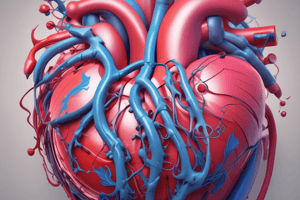Podcast
Questions and Answers
What is the most common cause of chronic mitral regurgitation?
What is the most common cause of chronic mitral regurgitation?
- Pulmonary hypertension
- Right ventricular hypertrophy
- Chordae tendinae rupture
- Mitral valve prolapse (correct)
In younger people with mitral valve prolapse, what is the usual cause?
In younger people with mitral valve prolapse, what is the usual cause?
- Acquired mitral valve disease
- Excess valve leaflet material (correct)
- Congenital septal defects
- Rupture of chordae tendinae
What can worsen regurgitation in individuals with mitral valve prolapse?
What can worsen regurgitation in individuals with mitral valve prolapse?
- Septal defects
- Lengthening and rupture of chordae tendinae (correct)
- Pulmonary hypertension
- Right ventricular hypertrophy
What may produce murmurs in individuals with septal defects?
What may produce murmurs in individuals with septal defects?
What is the likely result when a septal defect is not accompanied by other abnormalities?
What is the likely result when a septal defect is not accompanied by other abnormalities?
What is the consequence of blood accumulation in the left atrium?
What is the consequence of blood accumulation in the left atrium?
What happens to compensate for increased pulmonary pressure?
What happens to compensate for increased pulmonary pressure?
What can lead to pulmonary hypertension and edema?
What can lead to pulmonary hypertension and edema?
What produces the 'lub' sound of the heart?
What produces the 'lub' sound of the heart?
When is the 'dub' sound of the heart heard?
When is the 'dub' sound of the heart heard?
What is the most common cause of murmurs in the heart?
What is the most common cause of murmurs in the heart?
What can cause defective heart valves?
What can cause defective heart valves?
In which phase do the semilunar valves close to produce the 'dub' sound?
In which phase do the semilunar valves close to produce the 'dub' sound?
What happens in mitral stenosis?
What happens in mitral stenosis?
What causes damage to the heart valves in rheumatic endocarditis?
What causes damage to the heart valves in rheumatic endocarditis?
Flashcards are hidden until you start studying




